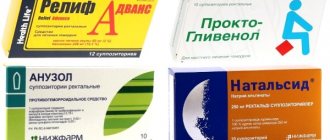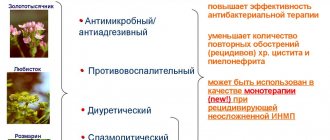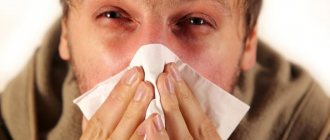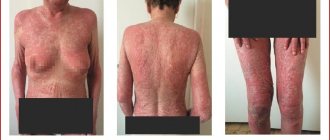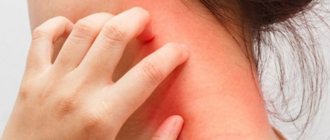April 27, 2020
Regular treatment with ointment is one of the mandatory methods of treating psoriasis on the arms, legs, face and other parts of the body. The oily texture of such external products allows the active ingredients to remain on the skin for a long time, which makes them more effective than creams and gels.
The list of ointments for psoriasis includes two main types of products:
- Hormonal. They can bring good results, but have many side effects.
- Non-hormonal. Less effective, but safer compared to hormonal ones.
Medicinal properties of the drug
The ointment is intended for external use, has a local anti-inflammatory, antiseptic effect, dries the mucous membranes and skin in the affected areas, accelerates tissue regeneration, reduces pain and other unpleasant symptoms: burning, itching. Substances included in the medication:
- help improve venous blood flow;
- stimulate microcirculation in tissues, accelerate the resorption of edema;
- reduce histamine activity in allergic dermatitis and hay fever;
- accelerate the healing of damaged epithelium in the area of hemorrhoids;
- prevent the development of massive bleeding and the formation of blood clots in the initial stages of hemorrhoids, when nodes are pinched, and prevent exacerbations;
- improve the condition of capillaries, reduce their permeability;
- stimulate nutrition and tissue restoration of the affected areas, prevent the progression of the disease;
- accelerate the healing of external and internal hemorrhoids;
- prevent relapses of allergic rhinitis and dermatitis.
Fleming's ointment has a cumulative healing effect. It is not an emergency treatment; it eliminates unfavorable symptoms gradually, but for a long time. The drug does not have a systemic effect on the body. The concentration of its components is too low to be absorbed into the general bloodstream.
Effective drug treatment of hemorrhoids
Both women and men experience unpleasant symptoms of the disease equally. They can occur already in the first stages. The first “bells” may be a slight burning sensation in the anus, itching, discomfort and pain during bowel movements. Further, the painful sensations will only intensify, and bleeding may appear. During an exacerbation, dizziness, nausea and general malaise may occur. In the absence of proper treatment in the initial stages, hemorrhoids become chronic with periods of exacerbation and remission.
The symptoms of the acute phase of the disease can be relieved with the help of emergency therapy in the form of local products - gels, ointments and creams for external use to heal cracks and relieve swelling of the anus; rectal suppositories and suppositories that act on the tissue of the rectal mucosa; painkillers. When the first signs of inflammation of the hemorrhoids appear, you should immediately contact a proctologist to rule out other diagnoses and determine the stage of the disease.
Groups of painkillers for hemorrhoids
To treat hemorrhoidal “bumps,” a large number of herbal and synthetic drugs of various types are used, the names of which can be found in any pharmacy. Each group of drugs has its own indications for use, pharmacological effect and dynamics of effectiveness during the treatment process - how quickly and efficiently the drug can relieve pain from attacks of the disease.
The main list of the group includes the following names:
- Venotonics and phlebotonics - tablets increase vascular tone, improve blood microcirculation, and relieve symptoms of thrombosis. The most popular names of drugs in this group are “Phlebodia 600”, “Detralex”;
- Angioprotectors - act on damaged vessel walls, relieve inflammation and swelling, and promote effective tissue restoration of hemorrhoids. Popular drugs are Troxevasin and Ascorutin;
- Non-steroidal anti-inflammatory drugs - relieve inflammation, can relieve pain at any stage of the disease, even when cracks and tears appear in the nodes. This group includes Ketorolac, Nurofen, Ibuprofen;
- Antispasmodic drugs – relieve spasms and pain. The medicine relieves pain in the anus for a certain period and alleviates the patient’s condition. The most effective drug "No-Shpa";
- Anesthetic injections are one of the most potent groups of drugs that block pain. Injected into the anus or gluteal muscle. They are used in extreme cases when other medications do not help. Names of active drugs Lidocaine and Diclofenac;
- Preparations with herbal components are used in the initial stages of enlargement of hemorrhoidal “bumps”, when there are no complications in the form of anal fissures and regular bleeding. Basically, these are topical drugs.
Indications for use of Fleming's ointment: instructions
It is recommended to use the drug for diseases of the nasal mucosa and hemorrhoidal lesions of the rectum:
- at the first and second stages of hemorrhoids: the presence of external and internal nodes, with frequent exacerbations, irritation of the epithelium, swelling of the anal veins;
- with vasomotor rhinitis: increased nasal discharge, swelling of the mucous membrane;
- with a deviated nasal septum and associated symptoms: difficulty in nasal breathing, congestion;
- for allergic dermatitis, regardless of the type of allergen and seasonality of the pathology;
- with hay fever.
According to user reviews, Fleming's ointment helps well with uncomplicated hemorrhoids: it relieves itching, pain, and swelling for a long time. There is evidence that the drug effectively eliminates the signs of initial sinusitis, reduces purulent discharge, and relieves the feeling of heaviness and fullness in the paranasal sinuses.
Compound
The main active ingredients in Fleming's nasal ointment include exclusively natural ingredients:
- Calendula is considered a natural antiseptic. The plant eliminates inflammation during a runny nose and accelerates cell recovery.
- Witch hazel essential oil stops the growth and spread of bacteria in rhinitis. The composition strengthens blood vessels and improves blood circulation.
- Aesculus is a combination of several elements. These are fibers from the arteries of domestic animals, arnica, chestnut, ergot, rue, and echinacea. It normalizes microcirculation, is widely used in proctological practice, and is an active component of Fleming's ointment for hemorrhoids.
- Peppermint essential oil eliminates burning sensation, relieves itching, softens nasal mucous membranes, cools the skin, and has a slight antiseptic effect.
The drug also contains additional substances: zinc oxide with adsorbing and astringent functions. Vaseline is necessary for the production of dosage forms in the form of ointments.
When is the drug contraindicated?
The homeopathic remedy is gentle and well tolerated by most patients. Side effects are virtually eliminated. It has few contraindications:
- individual hypersensitivity to components, frequent symptoms of which are: a sharp increase in discharge, itching and burning, severe dryness, tissue swelling;
- children under 2 years of age: the mucous membrane of infants has an imperfect structure, which is why unpredictable reactions to the medicine are possible.
Pregnancy is not a contraindication for the ointment; it does not have a teratogenic effect on the fetus or the health of the mother. But it should be used with caution, taking into account the individual characteristics of the body.
Directions for use, doses
When treating hemorrhoids, the ointment must be applied to the surface of the nodes with a cotton swab 1-2 times a day, depending on the severity of the process. It is first recommended to wash the anus area with warm water and blot with a soft cloth. In case of exacerbations, the procedure is repeated 3 times a day. To lubricate the internal components, you can use special applicators or cotton swabs. For the success of treatment, it is important to follow a diet, and for constipation, use laxatives. The course of continuous use of the ointment is 7 days. Then a survey of the condition is necessary.
Vasomotor rhinitis is treated with cotton wool. They need to be lubricated with the drug and placed in the nostrils for 10 minutes, after clearing the nose of secretions. Another option: apply Fleming's ointment to the mucous membranes of the sinuses 2-3 times a day. Depending on the severity of the disease, you can use the drug for up to 2 weeks continuously until the runny nose and congestion disappear. If there is no result, ointment therapy should be discontinued.
Allergic dermatitis is treated by applying a thin layer of the drug to clean skin in the morning and before bed. If necessary, the area where the ointment is applied can be covered with a thin fabric bandage. Duration of therapy is up to 2 weeks.
Medicinal properties
For a runny nose, hemorrhoidal manifestations, inflammation of the nasal mucosa, Fleming's ointment mobilizes the body's defense mechanisms, reduces venous congestion, improves blood circulation in tissues and accelerates regeneration processes.
The components stabilize the capillary walls, reducing the amount of lysosomal enzymes that destroy the glycocalyx, which is necessary for the strength and elasticity of blood vessels. The drug increases the level of hyaluronic acid, provides elasticity and normalizes water balance. As a result, transcapillary exchange is regulated and the risk of venous insufficiency is reduced.
The product has analgesic properties, eliminates exudate from inflammation of the nasal mucosa and rhinitis, and relieves spasms. Zinc oxide forms albuminates and changes the native confirmation of protein molecules, creating a protective barrier against irritating factors.
The use of the product allows you to achieve the following therapeutic effects:
- Remove puffiness
- Narrow the walls of blood vessels.
- Restore the structure and normalize the condition of the mucous membranes
- Stimulate nutrition of cells and tissues
- Improve lymph flow
- Eliminate pain syndrome
- Relieve itching and irritation
- Reduce the volume of hemorrhoids
- Reduce stagnation
- Eliminate inflammation during a runny nose
- Remove redness of the nose
- Stop bleeding in the sphincter area
- Protect against re-infection and damage.
Interaction with other drugs
Fleming's ointment does not affect the action of other medications, does not increase their toxicity, does not increase or decrease their effectiveness. But given that the drug belongs to the category of homeopathic, it is advisable to use it without combining it with other medications and antiseptics. When treating diseases together with venotonic, anti-inflammatory, vasoconstrictor agents, it is recommended to take a break of 3-4 hours before applying homeopathic ointment.
During the treatment period, it is important to adjust your diet: reduce salt intake, avoid sour foods, hot spices, and alcoholic beverages. Otherwise, the effectiveness of the drug will be reduced to zero.
Non-hormonal ointments for psoriasis
Non-hormonal agents are considered moderately effective and at the same time inexpensive ointments for psoriasis. Their advantages compared to hormonal ones include:
- relative safety;
- lack of addiction;
- lower cost;
- possibility of long-term use without harm to health;
- no serious side effects;
- preservation of hormonal levels;
- no load on the liver and kidneys;
But even with all the advantages, non-hormonal ointments for psoriasis cannot be called truly effective. Unlike hormonal ones, they have a much weaker effect. Their effect does not appear so quickly, so they are prescribed only for mild manifestations of psoriasis. They are also considered safer for the treatment of psoriasis in children.
Non-hormonal ointments eliminate peeling, swelling, itching, relieve inflammation and irritation. In addition, despite the safer composition, the use of such drugs does not exclude the development of an allergic reaction if a person is intolerant to one or another component.
Depending on the effect they provide, all non-hormonal ointments are divided into several categories:
- Others: ichthyol, cartolin, grease, tar, naphthalan. They have anti-inflammatory and antiseptic effects. But it must be borne in mind that such ointments are not recommended for the progressive stage of psoriasis and for large lesions. Tar ointment is contraindicated in phototherapy because it has a photosensitizing effect.
- Herbal medicines. This includes products based on sage, celandine, aloe, elecampane and other plant components. They are considered the safest of all non-hormonal ointments. But the plant base can cause allergic reactions.
- Keratolytics: zinc, salicylic, zinc-salicylic. Their main property is the exfoliation of dead cells, which in psoriasis do not have time to be rejected. Keratolytics can cause increased inflammatory reactions, a burning sensation, and increased pigmentation of surrounding healthy skin.
Moisturizing ointments are used as non-hormonal auxiliary agents for psoriasis. But they only help eliminate the feeling of dryness and tightness of the skin.
Features of non-hormonal ointments
Salicylic ointment for psoriasis is one of the most inexpensive, but it must be borne in mind that its action for such a serious disease is often insufficient. They show good exfoliating, softening and antiseptic effects, but like other non-hormonal ointments, they take at least 2 weeks to appear, and sometimes later.
The same can be said about the use of grease-based ointment for psoriasis. In addition, these are very specific products that have a pungent odor. It can stick to furniture and clothing and is very difficult to wash off.
Among the listed ointments there are no those for the use of which clinical trials have been conducted. This means that their effectiveness is only confirmed by the experience of some users. Clinical trials were carried out only on the following drugs:
- as Pimecrolimus (Elidel cream);
- Calcipotriol (Davonex);
- Zinc pyrithione (Zinocap).
This suggests that their use can indeed be beneficial. But Pimecrolimus, if used uncontrolled, has a risk of infection, and Calcipotriol should not be used if more than 30% of the skin surface is affected, as this can lead to hypercalcemia.
The only extremely safe remedy remains zinc pyrithione. Thus, answering the question of which ointment is best for psoriasis, we can say that Zinocap. But this does not negate the fact that its effect is still weaker than that of hormonal drugs.






